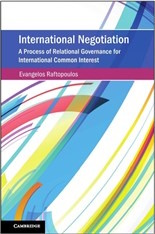Author
Evangelos Raftopoulos, Panteion University, Athens
Publication Year
January 2019
Source
ISBN: 978-1-107-19664-3
Series
Cambridge Studies on Environment, Energy and Natural
Resources Governance
General Series Editor: Jorge E. Vi?uales
Evangelos Raftopoulos explores international negotiation as a structured process of relational governance that generates international common interest between and among international participants and in relation to the international public order. He challenges prescriptive models of negotiation – developed in international relations and positivistic approaches to international law, which artificially separate treaties from negotiation in the name of ‘objectivity’ – and opens a window for looking at international negotiations from a novel, international law perspective. Using an interdisciplinary approach that incorporates law, philosophy, politics, and linguistics, he proposes a holistic, theoretical model of multilateral international negotiation that not only offers a ‘subjective’ view of international law in practice but also demonstrates the importance of understanding the horizontal normativity of international ordering. This work should be read by academics and practitioners of international law and negotiations, officials of international organizations, and anyone else interested in international law and international relations.
- Proposes a relational theory of international creative negotiation
- Adopts a novel view of international negotiation as a relational, contextual, textual, three-phased and inter-subjective process of multilateral governance
- Equips readers with the fundamental conceptual elements needed to understand international negotiation as a structured, multilateral process generating and constructing international common interest.
Preface and Acknowledgments
List of Abbreviations
Introduction
Part I – Theoretical Approaches to International Negotiations and International Common Interest
1. The Theorization of International Negotiation: Autonomous Prescriptive Theoretical Models And Their Deficiencies
1 A Panoramic Critical View; 2 Zero-Sum Situations and Distributive or Positional Negotiation; 3 Non-Zero-Sum Situations and Integrative Negotiation; 3.1 The Methodological Model of the Harvard Principled Negotiation; 3.2 The Prescriptive Transformative Model: A Theoretical Message from Game Theory; 3.2.1 Structural Characteristics and Contextuality; 3.2.2 Situational Characteristics and Contextuality; 3.2.3 Strategy Choice and Contextuality.
2. International Creative Negotiation: A Relational Theoretical Framework
1 International Negotiation as a Holistic Theoretical Approach: International Creative Negotiation as Governance of International Common Interest; 2 “Dancing in a Relationship,” or, on the Relational Nature of International Creative Negotiations; 3 On the Textuality of International Creative Negotiation; 4 On the Phased Structure of International Creative Negotiation; 5 On the Contextuality of International Creative Negotiation; 6 On the Subjectivity of International Creative Negotiation; 6.1 The Setting Up of a Negotiation Team; 6.2 The Organization and Decisional Configuration of the Negotiation Team; 6.3 The Accountability of the Negotiation Team; 6.4 The Process Advisory Role of the Negotiation Team.
Part II – The Negotiation Phases in the Conventional Construction of International Common Interest
3. The Prenegotiation Phase as a Process of Transformative Governance
1 Introductory Critical Remarks; 2 The Diagnostic Level; 2.1 Generating the Level of Negotiation Focus; 2.2 The Leading Role of the Initiator of Prenegotiation; 2.3 The Determination of Negotiable Issues; 2.3.1 Thematic Diagnostic Approach: The Management of Knowledge; 2.3.2 The Subjective Diagnostic Approach: The Management of Subjective Framings; 2.3.3 The Management of Contextuality of the Prenegotiation Transformation; 2.3.4 The Management of Alternative Solutions to Prenegotiation; 3 The Multilateral Governance Level; 3.1 Institutional Organization and Management of the Prenegotiation Process; 3.1.1 Structure and Function of Ad Hoc Multilateral Conference; 3.1.2 The Techniques of Managing Ad Hoc Multilateral Conference; 3.2 The Patternment of the Content of Declarative Instruments; 4 The Outcome of Prenegotiation.
4. The Constitutive Negotiation Phase as a Process of Constructing Treaties of International Common Interest
1 Overview; 2 Initiation and Institutional Organization of Constitutive Negotiation; 2.1 The Political Initiative; 2.2 The Negotiation-Generating Decision; 2.3 The Ad Hoc Body of Conferential Negotiation; 2.4 The Role of the Secretariat as a Guardian of the Constitutive Negotiation Process; 3 The Consensus Procedure as a Negotiating Practice of Constructing Common Interest; 3.1 The Two Aspects of the Consensus Procedure; 3.2 The Consensus Relational Level; 3.3 The Strategic Management Level; 3.4 The Organizational Management Level; 3.4.1 The Procedural Techniques of Lateral Expansion and Fragmentation of Issues; 3.4.2 The Conference-Scaling Practices: Sub-fora and Miniaturization of Conferences; 4 Rules of Procedure and Practices; 4.1 Purpose and Definitions; 4.2 Place and Time of Meetings; 4.3 Invitation of Observers; 4.4 Public and Private Sessions of the Meetings; 4.5 Agenda Setting; 4.6 Representation; 4.7 The Bureau of the Negotiating Meeting or Conference; 4.8 The Organization of the Negotiating Meeting or Conference; 4.9 Conduct of Business; 4.10 Decision-Making; 4.11 The Languages of the Negotiating Meeting or Conference; 4.12 Amendments: Relationship to the Conventional Regime; 5 Negotiation of the Textual Pattern of International Agreements; 5.1 Patternment at the Level of Context of Reference (Referential Patternment); 5.1.1 Identifiability of the Context of Reference (Context Identification); 5.1.2 Consistency with the Context of Reference (Contextual Consistency); 5.1.3 An Added-Value or Constructive-Heuristic Field; 5.2 Morphological Patternment; 5.2.1 The Framework Agreement-Performative Protocols in Processu Approach; 5.2.2 The Integrative Agreement-Performative Annexes in Processu Approach; 5.3 Normative Patternment or Patternment of Content; 5.3.1 The Preamble; 5.3.2 Legislative Use of Terms: Legislative Definitions; 5.3.3 Purpose and Scope of Application; 5.3.4 General Duties-Obligations; 5.3.5 The System of Multilateral ICI Governance; 5.3.5.1 Thematization; 5.3.5.2 Institutionality; 5.3.5.3 Controllability; 5.3.5.4 Transformability; 5.3.5.5 Subjectivity; 6 Special Techniques and Practices of Constitutive Textual Negotiation; 6.1 Organizational Techniques and Practices; 6.1.1 Opening Statements; 6.1.2 Brainstorming Sessions; 6.1.3 Inter-Sessional Workshops; 6.1.4 Side-Events; 6.2 Textual Techniques and Practices; 6.2.1 The System of Brackets; 6.2.2 Recording the Names of Negotiating Participants in the Reports of the Meetings and Conferences; 6.2.3 Νon-Negotiation Text: “Non-Paper”; 7 The Outcome of Constitutive Negotiation 219.
5. The Renegotiation Phase as a Process of Revisionary Governance of Conventional Regimes
1 Negotiable Transformation Mutatis Mutandis; 2 Initiation and Institutional Organization of Renegotiation; 2.1 The Initiation of Renegotiation; 2.2 The Institutional Guardianship of the Secretariat in the Renegotiation Process; 3 Renegotiation of the Textual Pattern of an International Agreement; 3.1 The Contextuality of Renegotiation; 3.2 The Morphological Patternment of Amendment; 3.3 Amendment or Replacement? The Dynamic of the Renegotiation Process; 3.4 Alternative Options to Renegotiation?; 3.5 Renegotiating the Treaty Regime Declarative Components; 4 The Outcome of Renegotiation; 5 In the Twilight Zone between Renegotiation and Constitutive Negotiation: Renegotiating the Under-Determinate Edges of a Treaty Regime; 5.1 Renegotiating the Undetermined Crime of Aggression of the Rome Statute of the ICC and the Way to the Kampala Revisionary Compromise; 5.1.1 Referential Context, the Rome Compromise, and Institutional Layers of Renegotiation; 5.1.2 The Twinning Renegotiating Process; 5.2 The Kampala Revisionary Compromise.
Bibliography
Index
‘Raftopoulos challenges scholars of international relations and international law to think of the treaty process as an integrated set of interim, subjective practices. He promotes a relational theory that treats the links between negotiations and treaties as an ongoing process of promoting global welfare. His approach goes well beyond conventional strategic power based theories of international relations and static positive theories by international lawyers about the nature of multilateralism itself.’ Peter M. Haas – University of Massachusetts, Amherst
‘When I was involved in negotiations for drafting treaties, I often had the feeling that the negotiators, rather than putting forward particular positions, were called to define an international common interest and to envisage a regime subject to future governance and re-negotiation. This book goes beyond feelings and subjects the process of building international common interests to a rigorous analysis within a solid theoretical approach.’ Tullio Scovazzi – University of Milano-Bicocca, Milan
Professor Evangelos Raftopoulos presents a new and welcome perspective on the international negotiation process. Without doubt this in-depth and thought-provoking study of international negotiations of legal instruments will generate much discussion as he takes the reader through the matrix of the international negotiation process through both an intellectual and pragmatic lens. Professor Raftopoulos demonstrates his extensive knowledge of the complexities and intricacies of international negotiations in this masterfully written book.’ Nilufer Oral – Istanbul Bilgi University and Member of the UN International Law Commission
‘Negotiations are traditionally perceived as belonging to the realm policy; the frequent end result of it, treaties, as belonging to the realm of law. This interesting and innovative study by a leading Greek international law scholar brings both strands together in the analysis as to how they contribute to the crystallization of international common interest.’ Robert Kolb – University of Geneva
‘As a colleague of Professor Evangelos Raftopoulos, I would like to express my satisfaction that Cambridge University Press is publishing his book entitled International Negotiation: A Process of Relational Governance to International Common Interest. Although it is not evident from the title of this forthcoming book and the one that I received from Professor Raftopoulos many years ago, there are many problems and principles of public international law that form the basis of the content of both books. The title of the former book of Professor Raftopoulos that I mentioned is The Inadequacy of the Contractual Analogy in the Law of Treaties published in 1990. I congratulate Professor Raftopoulos for adding the interesting new book of the Greek Professor to the fundamental literature of international law.’ Budislav Vukas – University of Zagreb




